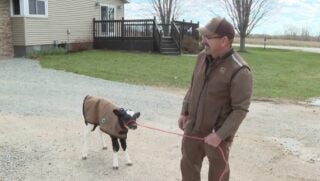Our farmers and ranchers to the far far north are feeling cut off in more ways than one. Alaska Gov. Michael Dunleavy announced his vetoes of roughly $400 million from Alaska’s fiscal year 2020 budget. These vetoes have nearly decimated agriculture programs in Alaska and almost effectively pushed farmers out of business.
One example of this is the story of Alaska’s last dairy farm, Havemeister Dairy. The dairy farm is now facing an uncertain future after the governor announced a new budget proposal that could eliminate funding for dairy regulation. The dairy is a Grade A facility and requires a licensed inspector to maintain its status. Without someone from the state to inspect, they will lose their status and their business.
Due to cuts, the Division of Agriculture was almost entirely eliminated — $1.2 million from Agriculture Development, $375,000 for the hemp program, $1.1 million removed from Plant Materials Center, $319,000 removed from the Agriculture Revolving Loan Program administration.
“In a time when Alaska agriculture is seeing such significant growth and having a measurable impact in creating food security for Alaska, it’s baffling why the programs supporting this growth would be cut,” says Alaska Farm Bureau President Scott Mugrage.
The recently released Census of Agriculture shows Alaska leading the nation in percent of growth in the number of farms. There has also been 20 percent growth in the value of products sold. Programs operated through the Division of Agriculture have been a key part of this growth through things like; developing markets, increasing trade, product research and operating the Alaska Grown program.
In a press release explaining the budget cuts Dunleavy said, “With the state of Alaska now pointed in the right direction, this budget eliminates our deficit by 50 percent. With an overall reduction of $678.8 million this year, next year we can close the state’s remaining deficit of $730 million.”
Mugrage says that the impact of these vetoes will be far-reaching, impacting food, jobs and families in all parts of the state. Without the growth of agriculture in Alaska, reliance on shipping to get food here will increase. At a time when Alaska needs to be self-sufficient, the governor’s veto will make Alaska more dependent on other states and countries to provide our food.
“Cuts like these send the message that Alaska doesn’t care about food security or agriculture in general,” says Mugrage. “We hope that Alaska legislators will show their support for Alaska agriculture and a sustainable food system by overriding these vetoes.”


